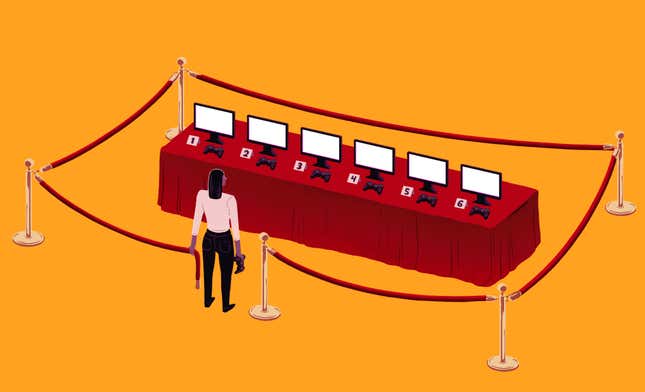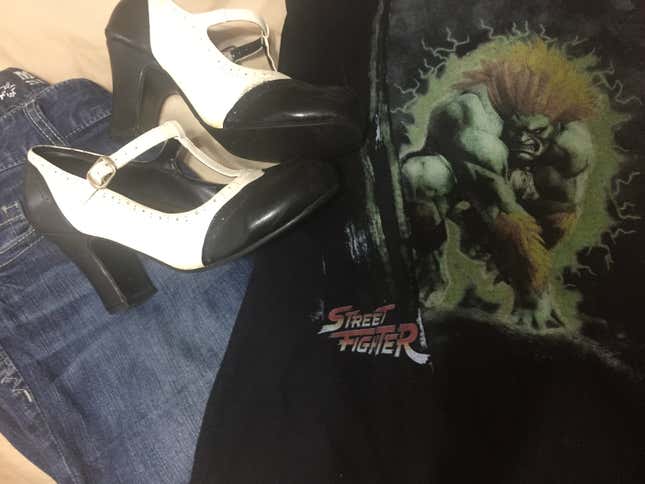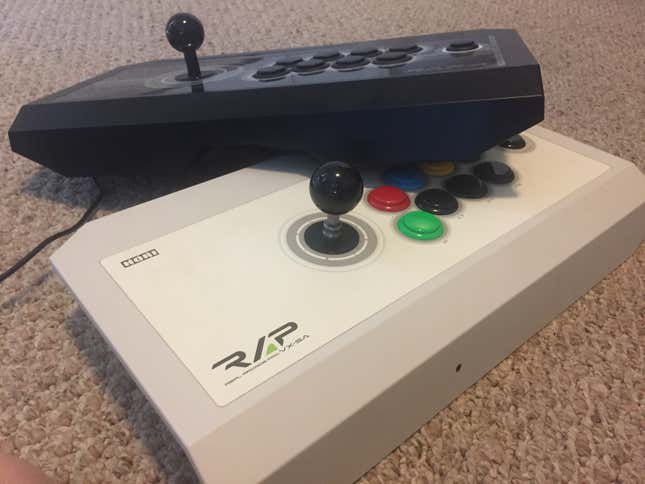
Are you are a woman who wants to compete in a fighting game event, but you don’t know where to start? Maybe you’re worried you don’t know enough or aren’t good enough. (Probably not true.) Or maybe you just want to know what these events are like ahead of time. Which ones should you try first? What should you bring? Are people going to make it weird as soon as they notice a girl is there?
This guide doesn’t and can’t possibly encompass every gal’s experience, only my own. In my experience, some people will be surprised—too surprised—to see you competing. That’s why I would love for you, dear reader, to join me in battling the ancient skeletons of video game purgatory by entering tournaments and saying, yes, I am a woman, competing at a video game. We will repeat that, in unison, until it no longer surprises anyone ever again.
The reason it still surprises people, though, is because very few girls or women compete in game tournaments. There’s a persistent myth that women and girls just aren’t that interested in competitive games, or even that they’re not biologically capable of playing well. (There’s no science to back any of that up.) My theory is, women don’t compete because these events seem intimidating and inaccessible. That, and it’s not that fun to be the exception and to have a lot of people watching you because you stand out for reasons you can’t control.
That’s why my first tip is about learning to play well under pressure.
1. Enter online tournaments first
If you’re just starting out with competitive fighting games, you should begin with a casual online tournament. It’s less nerve-wracking to enter a fighting game tournament online because no one can see you. If you lose, you can just type “good game” and close the tab. You don’t have to deal with shaking someone’s hand, smiling like you totally don’t care (but of course you do), packing up your fight stick, then driving home in the dark while beating yourself up about your mistakes as you listen to Street Fighter III: Third Strike’s “Knock You Out.” Instead, you can just skip straight to sitting on your living room couch and thinking about how badly you played. Great way to save gasoline.
Seriously, entering an online tournament will produce some of the same intense nervous energy as an in-person one, which means it’ll help you practice playing a video game while enduring those pesky nerves. If you think you feel nervous about playing ranked matches online, participating in a tournament could still take you by surprise. There’s just something about seeing your gaming handle on an official bracket that gets the ol’ heart rate up and the stomach juices roiling. It’s much harder to play well under those circumstances, but practice helps.
Almost every competitive game out there has a subreddit or a forum community that organizes newcomer-friendly online tournaments and practice events. For example, the Street Fighter subreddit features frequent posts about casual online meet-ups for players hoping to practice against competitors at a similar level. That subreddit also has a chat channel on Discord called “New Challengers” that organizes more official online tournaments with new players in mind. Street Fighter’s following is huge, but even lesser-known fighting games like Skullgirls have their own subreddit that hosts a weekly Wednesday online tournament. Once you graduate to wanting to take part in bigger online tournaments, the website smash.gg offers comprehensive listings for both online tournaments and in-person competitive gaming tournaments.
After you’ve grown used to the setbacks of nervousness, you’ll be ready to attend an in-person event, such as a local pick-up fight night at a gaming store or arcade near you, or an actual tournament. (Check your local gaming store’s website or social media to find out if they host a weekly fight night or regular tournaments.) Playing at an in-person event will be even harder because there will be people talking or cheering nearby. Your match might be on a screen watched by many other people, perhaps even accompanied by commentators. Your heart rate will definitely go up in that scenario. That’s why it’s good to prepare to play well under those conditions ahead of time.
2. If you can choose, play in a Tournament instead of at a Fight Night
So, you’re ready to leave your home and play fighting games against in-person opponents. You have two options: fight nights and tournaments. In theory, attending a casual local fight night would be fun and low-pressure. Instead, it’s a smaller environment with 10-15 strangers who may or may not turn out to be the type of guy who gets uncomfortable or outright angry at the idea of a woman being in a competitive space alongside them. That’s a dice roll.
Since it’s usually just a handful of dudes—and, in my experience with local fight nights in the New England area, it’s always dudes—one bad apple can spoil the bunch with ease. The issue might not even be your presence. If one guy has a bad night, he can make damn sure everyone else does, given the close quarters of these events. There might only be one staffer on hand, and they may or may not give a shit about mitigating disputes. I once attended a fight night where a sore loser threw a controller at one of the monitors and broke it, then stormed out. How well do you think everyone else played after that?
By contrast, a tournament usually has multiple staffers and a well-defined structure. Even the most disorganized tournaments tend to have multiple volunteers running the show, none of whom want to piss off whoever owns the rented venue. There’s usually an online registration, plus a format and schedule provided ahead of time. Sometimes, there’s even a harassment policy in place! Because tournaments are bigger and more structured, it’s a lot easier to avoid a sore loser (or sore winner), or to walk away from a conversation headed in a gross direction.
At a tournament, there’s usually at least one or two other women competing, especially if you’re entering a tournament of several hundred participants. In my experience with the local New England scene, I’m usually one of 2-3 women participating in a tournament of 200-300. Those aren’t great numbers. But at least I’m not the only one.

3. Wear an outfit that makes you feel confident
Everyone will be wearing a T-shirt and jeans and sneakers. Everyone. You can wear that, too, if you want to blend in. I have a SFIV Blanka shirt that I like a lot.
Wearing a shirt you like helps with confidence-boosting psychological trickery, and winning at fighting games is as much about your own state of mind as it is about practicing your combos and spacing.
I also wear high heels, because I’m short. I like being able to get as close as possible to looking opponents in the eye.
4. Bring your own controller or arcade stick
At fighting game tournaments, there will be controllers offered, but usually not arcade sticks. I recommend you bring your own controller no matter what, because it’ll help you feel comfortable and at-home. It also guarantees your controller will work.
This advice goes for fight nights, as well, which have a more disorganized attitude in general. You’ll be glad you brought your own controller. Just make sure to label it so you don’t lose it.
Bring a connecting cable so you don’t have to worry about syncing your controller or experiencing any lag in-game. Many tournaments have rules in place stating that competitors must use a wired controller, anyway.
Tournament rules also allow players to ask for a button check ahead of time, although some players don’t request one. I always do. It’ll give you a chance to drill a couple of combos real quick and get some jitters out before the first match actually starts.

5. Bring a (patient) friend with you
A lot of my friends seem to think that fighting game events are boring... which is fair. There’s a lot of standing around and waiting involved. That said, I do tend to have more fun when I manage to convince a friend to come along with me.
6. Don’t leave the tournament right after you lose
There’s probably a loser’s bracket, so if you lose your first match then you’ll have the chance to play again and you could still win. Check in with the tournament organizer to be sure about which bracket you are in and where to go.
What’s more, it’s good etiquette to stick around and play some casual matches, even after you lose. You might even make a friend or two in the process, which is good, because of that thing I said earlier about your other friends who find these events boring.
7. Brace yourself for annoying conversations about your gender
I’ve noticed an oft-repeated misunderstanding in male-dominated gaming spaces that if a woman or girl is there, she “wants attention.” I can only speak to my own experience, but when I go to a fight night or a tournament, I want to blend in. I like watching other people play, participating in idle conversation, cheering along with the crowd, and playing a match or several matches without fanfare.
Unfortunately, since fight nights and tournaments tend to have an extreme minority of women and girls participating, the few who do partake stand out, thanks to the ingrained societal expectation that they wouldn’t be into this sort of thing. This results in annoying conversations. Not always rude conversations—just, boring ones. “You play this? You’re on the list to compete here? Wow, you?” This felt flattering and special when I was 14 and wanted to believe I was “cooler” than other girls. Now, I’m in my 30s and I can’t wait to stop enduring how “surprised” everyone is that I play video games.
I can’t tell if this is a problem that is getting better in fighting games scenes. It feels like trying to determine if you are in the middle of a swamp, or at the edge of a swamp. I have no way of knowing how big the swamp is, but I’ve been walking in one direction for a long time, and I’m still stuck in it.
8. You might get harassed, and it’s possible that there won’t be any rules against it.
It’s rad as hell that fight nights and tournaments can pop up in crappy basements simply from a few people hooking up a console and a monitor and making it happen. The “punk rock” underground vibe of the fighting game community is what makes it special, but it also can make it difficult to root out bad actors.
Several years back, a couple of guys in my local scene made me uncomfortable enough that I stopped going to events for a while. I couldn’t avoid them. They were at every event. Because local fighting game events often lack any form of institutional backing or “rules,” there was no structural method through which I could have reported them for, say, sexual harassment. What’s more, one of the guys in question was a staffer at one of the events I attended. To whom would I have reported him? Himself? I didn’t bother.
No matter who you are, it’s nerve-wracking to go to an in-person gaming event and challenge strangers to fight you. It’s even more challenging if you’re entering into a situation where you’re a visible minority, and where that might be a problem for some of the people there.
It’s almost impossible to predict what will happen in these situations until you go, and that uncertainty sucks! You might have a great experience and meet a ton of awesome people. That’s happened to me. You also might meet some huge assholes. That has also happened to me. Sometimes all at the same event.
The in-person dynamic of fighting game events, when they go well, is the best part of the scene. It’s not something that I want any girl or woman to miss out on simply because she is afraid that some asshole, somewhere, will try to ruin it for her.
I have a tip about this for people who organize these events: create an environment where it’s possible for attendees to report the people who have been treating them like shit.
Back to a tip for attendees: don’t be afraid to pack up your stick and walk out of a place. Heck, if you arrive somewhere and you go in and you don’t like the vibe, walk right back out again. I’ve done that. It’s embarrassing and it’s a waste of gasoline and it’s not something many dudes in your scene will ever understand, because many of them will feel comfortable anywhere they go.
You deserve to feel safe, and you won’t play well or have fun or learn a damn thing about fighting games if you don’t feel safe. Even the “mild” stuff—like the guys who stand too close, or stare at you for too long—those are acceptable reasons to walk out. You don’t need to wait until it gets really bad. If it’s even a little bit bad, go ahead and leave. Put your comfort first. There are better events out there, and you’ll have a really tough time learning the ropes and winning rounds if you don’t feel comfortable.
9. Don’t be surprised if people expect you to be amazing at fighting games.
There’s a stereotype that women are bad at games. But what’s weird is that in competitive gaming scenes, since there are so few women, people actually expect the few women who do show up to be incredibly good. One way this has manifested for me is, if I’m the only female player at a given event, complete strangers will crowd around to watch as soon as it’s my turn and express far more interest than in any prior match. This can be nerve-wracking, especially if you aren’t used to playing in front of people yet.
The few women and girls who show up to these types of events do tend to be really good, because they’ve had to overcome a lot of obstacles in order to get to a point where they want to compete in a tournament. For guys, it’s more socially normalized to compete even if you aren’t that good, but since women already have to deal with the stereotype that they’re just “someone’s girlfriend,” there’s more external pressure to perform well so as to exceed expectations. Plus, there’s the fantasy of a girl getting trash-talked by guys for being a girl and then overcoming all those obstacles and beating all of the guys. It’s a narratively satisfying fantasy, but it’s also a reductive one, because it means that a lot of girls and women feel like they shouldn’t play games in public at all unless they’re really good... or else they’ll be “making girl gamers look bad.”
From what I’ve seen, women who are just mediocre at fighting games just don’t end up going to these events. Except for me! I like to rep for all the decent but stubborn women out there by competing in tournaments and doing just fine, but not amazing. Just existing in the scene is a victory for me.
There are tons of dudes who enter tournaments and aren’t that good. They enter because they’re attending with friends and they just think it would be fun to try their hand. Women and girls should feel free to do the exact same thing— and who knows, you might end up facing off against one of those not-that-good guys who’s entering and then you can get a win or two under your belt.
We don’t need to keep framing female gamers as savants or exceptions. If more women competed in fighting games who were just okay, that would create a better environment for everyone.
The other people who are entering tournaments are probably not as good or as intimidating as you imagine they are. They’re just people who like fighting games. Like you!
These tips reflect my experience, but every local fighting games scene has its own quirks and etiquette. Tell me about your own first tournaments, or share the advice that motivated you or a female friend of yours to finally sign on for some in-person fighting game matches.